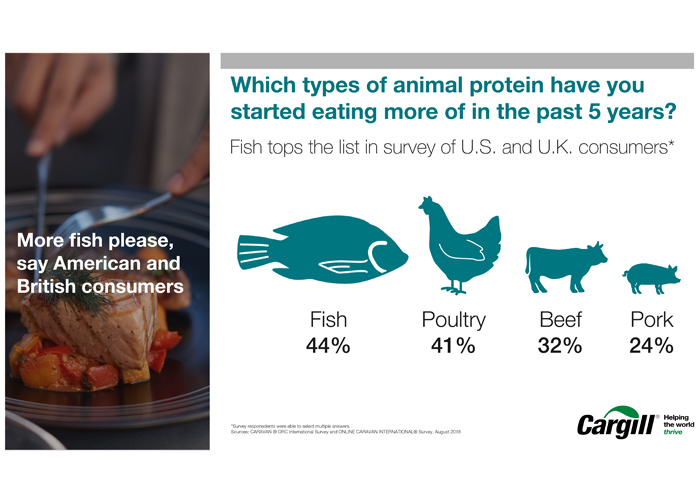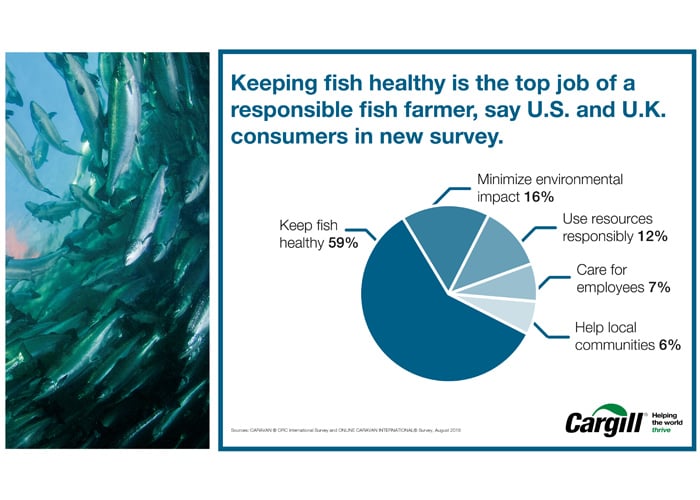More fish please, say U.S. and British consumers—and make it healthy
MINNEAPOLIS – (October 1, 2018) — Americans and Brits are increasingly saying “I’ll take the fish,” according to new research from Cargill.
 In its latest Feed4Thought survey, Cargill found that, over the past five years, 44 percent of American and British consumers surveyed had added more fish to their diets. Poultry came in a close second, followed by beef and pork.
In its latest Feed4Thought survey, Cargill found that, over the past five years, 44 percent of American and British consumers surveyed had added more fish to their diets. Poultry came in a close second, followed by beef and pork.
“More and more people are choosing fish as a source of protein because of its big impact on health and relatively small impact on our planet,” said Dan Burke, group director for Cargill’s aqua nutrition business in the U.S. and U.K.
Nearly three-fourths of the consumers surveyed said they choose to eat fish for health reasons—and that number increased with a person’s age. Fish is low in saturated fats, carbohydrates and cholesterol and high in a range of essential micronutrients, including vitamins, minerals and omega-3 fatty acids, according to the World Bank.
When it comes to health and environmental impact, nearly half of the respondents in the U.K. and one-third of those surveyed in the U.S. said there was no difference between farmed and wild-caught fish. The European Food Safety Authority agrees there are no consistent differences in the safety or nutritional value of wild and farmed fish, and both wild and farmed salmon have low levels of environmental pollutants, according to the Washington State Department of Health and Norway’s National Institute of Nutrition and Seafood Research.
Keeping fish healthy was ranked as the most important duty of a company committed to responsibly raising seafood. Cargill notes this is increasingly important to its customers too, which is why the company is developing innovative feeds and solutions that help animals stay healthy in the farm environment. As part of an integrated health management system, connecting farmers, feed companies and veterinarians, these allow for a proactive focus on fish health.
 “We’re also seeing growing interest in wholesome food production,” says Brian Knudson, strategic marketing and technology director for Cargill’s aqua business, “That’s why Cargill is expanding its micro nutrition business—focused on products that work with an animal’s natural biology to improve their overall health and wellbeing, and reduce the need for antibiotics in aquaculture.”
“We’re also seeing growing interest in wholesome food production,” says Brian Knudson, strategic marketing and technology director for Cargill’s aqua business, “That’s why Cargill is expanding its micro nutrition business—focused on products that work with an animal’s natural biology to improve their overall health and wellbeing, and reduce the need for antibiotics in aquaculture.”
Cargill recently acquired global animal health company, Diamond V, and has a strategic partnership with Delacon, the world’s leading maker of plant-based phytogenics. Both reinforce the company’s focus on fish health.
Healthier fish mean better resistance to disease, less reliance on antibiotics and more efficient use of feed. Survey respondents indicated the importance of these sustainability attributes as they confirmed that using resources responsibly and minimizing impact on the environment should be priorities for the responsible fish farmer. Cargill supports this priority as an active member of the Global Salmon Initiative (GSI), a group that propels innovation and improved sustainability performance in the farmed salmon sector using a pre-competitive model of collaboration.
One trend to note for the aquaculture industry: younger generations polled looked beyond the health of the fish and the environment to the overall societal impact of seafood farming. For Americans, this surfaced as an expectation that the seafood farm will help local communities. In the U.K., younger generations prioritized the treatment of seafood employees.
“We prioritize listening and responding to these expectations around responsible food, working with our value chains to deliver and communicate about healthy and sustainable seafood,” noted Dave Robb, sustainability manager for Cargill’s aqua business. “We’re committed to leading a global transformation toward sustainable seafood production by offering better feed for our customers, a safer workplace for our employees and more sustainable, transparent operations that support thriving communities.”
Media Contact: [email protected]
About Cargill
Cargill is committed to providing food, ingredients, agricultural solutions, and industrial products to nourish the world in a safe, responsible, and sustainable way. Sitting at the heart of the supply chain, we partner with farmers and customers to source, make and deliver products that are vital for living.
Our 160,000 team members innovate with purpose, providing customers with life’s essentials so businesses can grow, communities prosper, and consumers live well. With 159 years of experience as a family company, we look ahead while remaining true to our values. We put people first. We reach higher. We do the right thing—today and for generations to come. For more information, visit Cargill.com and our News Center.
About Cargill Animal Nutrition
Cargill’s animal nutrition business has more than 20,000 employees at more than 275 facilities in 40 countries. Fueled by our innovation and research, we offer a range of products and services to feed manufacturers, animal producers, and feed retailers around the world, helping put food on the plates of nearly one billion people around the world every day. Cargill’s animal nutrition business offers a range of compound feed, premixes, feed additives, supply chain and risk management solutions, software tools and animal nutrition expertise that is unmatched in the industry. For more information about Cargill Animal Nutrition, visit: http://www.cargill.com/feed.
About Cargill Animal Nutrition’s Feed4Thought Survey
Feed4Thought is a regular consumer survey effort from Cargill Animal Nutrition that explores key perceptions and opinions about important topics in the animal protein supply chain. The online survey for Cargill Animal Nutrition was conducted by ORC International. The U.S. survey was conducted in August 2018 and polled a demographically representative sample of 1,002 U.S. adults. The U.S. survey also was conducted in August 2018 and polled a demographically representative sample of 1,004 U.K. adults.
